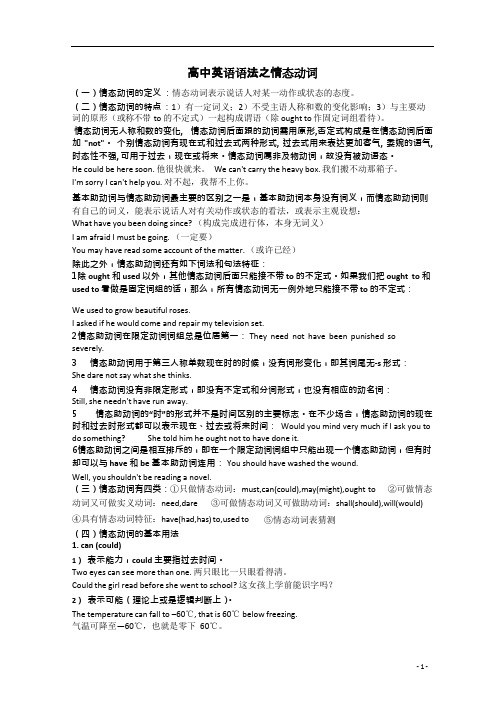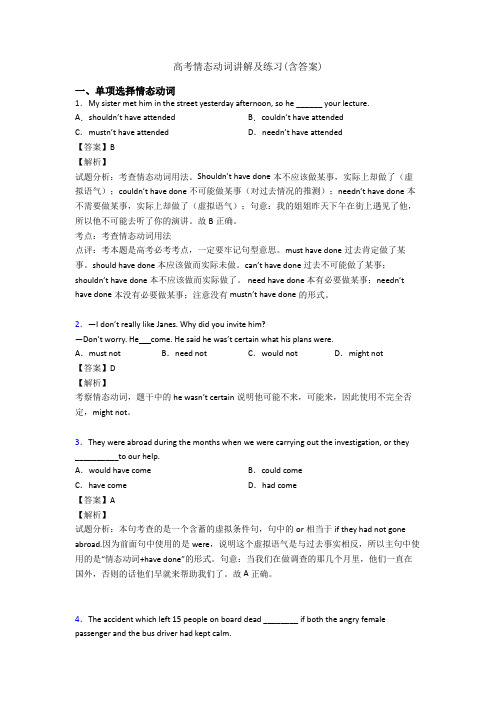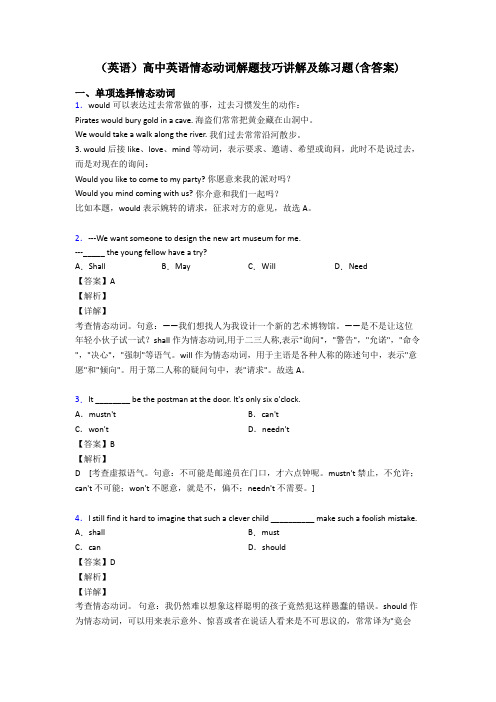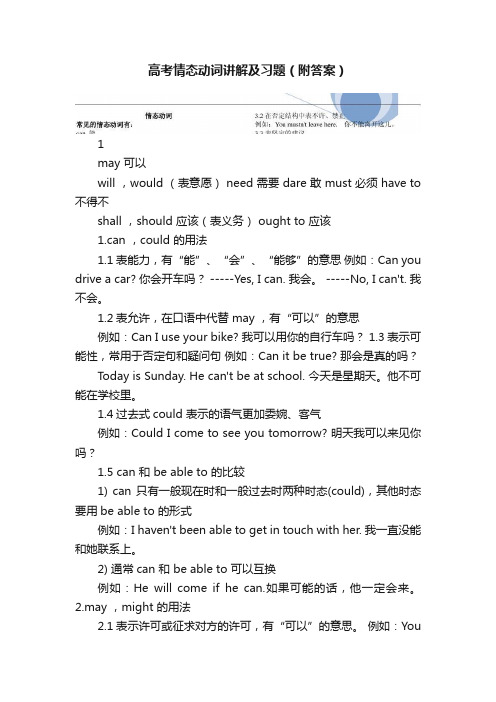高中英语语法情态动词讲义练习附答案
(完整版)高中英语情态动词讲解与练习(含答案),推荐文档

高中英语情态动词练习(附答案)

高中英语语法练习-情态动词一、基础练习1.He ___ have completed his work; otherwise, he wouldn't be enjoying himself by the seaside.A. shouldB. mustC. wouldn'tD. can't2. I _____ have been more than six years old when the accident happened.A. shouldn'tB. couldn'tC. mustn'tD. needn't3. This cake is very sweet. You ____ a lot of sugar in it.A. should putB. could have putC. might putD. must have put4. He paid for a seat, when he ____ have entered free.A. couldB. wouldC. mustD. need5. I was on the highway when his car went past followed by a police car. They ____ at least 150 kilometers an hour.A. should have been doingB. must have been doingC. could have doneD. would have done6. — Tom is never late for work. Why is he absent today?— Something __________ to him.A. must happenB. should have happenedC. could have happenedD. must have happened7. - Do you know where David is? I couldn't find him anywhere.- Well. He _______ have gone far-his coat is still here.A. shouldn'tB. mustn'tC. can'tD. wouldn't8. -Lucy doesn't mind lending you her dictionary.- She __________. I've already borrowed one.A. can'tB. mustn'tC. needn'tD. shouldn't9. - Catherine, I have cleaned the room for you.- Thanks. You _____ it. I could manage it myself.A. needn't doB. needn't have doneC. mustn't doD. shouldn't have done10. There________ be any difficulty in passing the road test since you have practised a lot in the driving school.A. mustn'tB. shan'tC. shouldn'tD. needn't11. - The woman biologist stayed in Africa studying wild animals for 13 years before she returned.-Oh, dear! She ________ a lot of difficulties!A. may go thoughB. might go throughC. ought to have gone throughD. must have gone though12. -I've taken someone else's green sweater by mistake.-It ______ Harry's. He always wears green.A. has to beB. will beC. mustn't beD. could be13. Helen _______ go on the trip with us, but she isn't quite sure yet.A. shallB. mustC. mayD. can14. If I ________ plan to do anything I wanted to, I'd like to go to Tibet and travelthrough as much of it as possible.A. wouldB. could C have to D. ought to15. You might just as well tell the manufacturer that male customers_____ not like the design of the furniture.A. mustB. shallC. mayD. need16. -Who is the girl standing over there?- Well, if you ______ know, her name is Mabel.A. mayB. canC. mustD. shall17. Children under 12 years of age in that country______ be under adult supervisionwhen in a public library.A. mustB. mayC. canD. need18. "The interest ______ be divided into five parts, according to the agreement madeby both sides," declared the judge.A. mayB. shouldC. mustD. shall19. -- I'll tell Mary about her new job tomorrow.--You _______ her last week.A. ought to tellB. would have toldC. must tellD. should have told20. I ______ pay Tom a visit, but I'm not sure whether I will have time this Sunday.A. shouldB. mightC. wouldD. could21. --I don't mind telling you what I know.--You ________. I'm not asking you for it.A. mustn'tB. may notC. can'tD. needn't22. --Excuse me, but I want to use your computer to type a report.--You________ have my computer if you don't take care of it.A. shan'tB. might notC. needn'tD. shouldn't23. --Excuse me. Is that the right way to the Summer Palace?--Sorry, I'm not sure, but it ______ be.A. mightB. willC. mustD. can24. --Mum, I've been studying English since 8 o'clock. ________ I go out and playwith Tom for a while?--No, I'm afraid not. Besides, it's raining outside now.A. can'tB. wouldn'tC. may notD. won't25. I often see lights in that empty house. Do you think I _____report it to the police?A. shouldB. mayC. willD. can26. Mr. White_______ at 8:30 for the meeting, but he didn't show up.A. should have arrivedB. should arriveC. should have had arrivedD. should be arriving27. You ________ be tired-you've only been working for an hour.A. must notB. won'tC. can'tD. may not二、提高练习1.--- Shall I tell John about it?--- No, you ______. I’ve told him already.A. needn’tB. wouldn’tC. mustn’tD. shouldn’t2. --- There were already five people in the car, but they managed to take me as well.--- It ______ a comfortable journey.A. can’t beB. shouldn’t beC. mustn’t have beenD. couldn’t have been3. --- Why didn’t you come to see me?--- I ______, but I was too busy yesterday.A. like toB. should like toC. would like to haveD. am going to-behaved gentleman ______ be so rude to a lady.4. You can’t imagine that a wellA. mightB. needC. shouldD. would5. There was plenty of time; she ______.A. mustn’t have hurriedB. needn’t have hurriedC. may not have hurriedD. wouldn’t have hurried6. --- Is John coming by air?--- He should, but ______ not. He likes taking trains.A. mustB. canC. needD. may7. --- ______ it be Li Ping who broke the glass?--- No. It ______ be Wang Hai who did it.A. Could; mayB. Can; canC. May; mustD. Can; must8. When the old man was alive, he ______ sit for hours at the door.A. wouldB. couldC. mustD. might9. Jack, you ______ play with the knife; you ______ hurt yourself.A. won’t; can’tB. mustn’t; mayC. shouldn’t; mustD. can’t; should10. I’ve decided to take the job and I ______ change my mind.A. mustn’tB. can’tC. won’tD. may not11. She ______ into the thick forest alone on such a dark night.A. dares not goB. dares not to goC. dare not to goD. doesn’t dare to go12. My parents never remember my telephone number, and they always ______ look it up.A. mustB. canC. shouldD. have to13. --- Where is Jack? I can’t find him anywhere.--- He ______ his homework upstairs.A. might have doneB. must have doneC. might be doingD. must do14. He ______ you more help, even though he was very busy.A. might have givenB. might giveC. may have givenD. may give15. --- If he ______, he ______ that food.--- Luckily he was sent to the hospital immediately.A. was warned; would not takeB. had been warned; would not have takenC. would be warned; had not takenD. would have been warned; had not taken16. --- I hear you've got a set of valuable Australian coins. ____I have a look ?--- Yes, certainly.A. DoB. MayC. ShallD. Should17. — When can I come for the photos? I need them tomorrow afternoon.。
高中英语情态动词讲解与练习(含答案),成才系列

高中英语语法之情态动词(一)情态动词的定义:情态动词表示说话人对某一动作或状态的态度。
(二)情态动词的特点:1)有一定词义;2)不受主语人称和数的变化影响;3)与主要动词的原形(或称不带to的不定式)一起构成谓语(除ought to作固定词组看待)。
情态动词无人称和数的变化, 情态动词后面跟的动词需用原形,否定式构成是在情态动词后面加"not"。
个别情态动词有现在式和过去式两种形式, 过去式用来表达更加客气, 委婉的语气, 时态性不强, 可用于过去,现在或将来。
情态动词属非及物动词,故没有被动语态。
He could be here soon. 他很快就来。
We can't carry the heavy box. 我们搬不动那箱子。
I'm sorry I can't help you. 对不起,我帮不上你。
基本助动词与情态助动词最主要的区别之一是,基本助动词本身没有词义,而情态助动词则有自己的词义,能表示说话人对有关动作或状态的看法,或表示主观设想:What have you been doing since? (构成完成进行体,本身无词义)I am afraid I must be going. (一定要)You may have read some account of the matter. (或许已经)除此之外,情态助动词还有如下词法和句法特征:1)除ought和used以外,其他情态动词后面只能接不带to的不定式。
如果我们把ought to 和used to看做是固定词组的话,那么,所有情态动词无一例外地只能接不带to的不定式:We used to grow beautiful roses.I asked if he would come and repair my television set.2)情态助动词在限定动词词组总是位居第一:They need not have been punished so severely. 3)情态助动词用于第三人称单数现在时的时候,没有词形变化,即其词尾无-s形式:She dare not say what she thinks.4)情态动词没有非限定形式,即没有不定式和分词形式,也没有相应的动名词:Still, she needn't have run away.5)情态助动词的“时”的形式并不是时间区别的主要标志。
高考情态动词讲解及练习(含答案)

高考情态动词讲解及练习(含答案)一、单项选择情态动词1.My sister met him in the street yesterday afternoon, so he ______ your lecture. A.shouldn’t have attended B.couldn’t have attendedC.mustn’t have attended D.needn’t have attended【答案】B【解析】试题分析:考查情态动词用法。
Shouldn’t have done本不应该做某事,实际上却做了(虚拟语气);couldn’t have done不可能做某事(对过去情况的推测);needn’t have done本不需要做某事,实际上却做了(虚拟语气);句意:我的姐姐昨天下午在街上遇见了他,所以他不可能去听了你的演讲。
故B正确。
考点:考查情态动词用法点评:考本题是高考必考考点,一定要牢记句型意思。
must have done过去肯定做了某事。
should have done 本应该做而实际未做。
can’t have done 过去不可能做了某事;shouldn’t hav e done 本不应该做而实际做了。
need have done 本有必要做某事;needn’t have done 本没有必要做某事;注意没有mustn’t have done的形式。
2.—I don’t really like Janes. Why did you invite him?—Don’t worry. He come. He said he was’t certain what his plans were.A.must not B.need not C.would not D.might not【答案】D【解析】考察情态动词,题干中的he wasn’t certain说明他可能不来,可能来,因此使用不完全否定,might not。
(英语)高中英语情态动词解题技巧讲解及练习题(含答案)

(英语)高中英语情态动词解题技巧讲解及练习题(含答案)一、单项选择情态动词1.would可以表达过去常常做的事,过去习惯发生的动作:Pirates would bury gold in a cave. 海盗们常常把黄金藏在山洞中。
We would take a walk along the river. 我们过去常常沿河散步。
3. would后接like、love、mind等动词,表示要求、邀请、希望或询问,此时不是说过去,而是对现在的询问:Would you like to come to my party? 你愿意来我的派对吗?Would you mind coming with us? 你介意和我们一起吗?比如本题,would 表示婉转的请求,征求对方的意见,故选A。
2.---We want someone to design the new art museum for me.---_____ the young fellow have a try?A.Shall B.May C.Will D.Need【答案】A【解析】【详解】考查情态动词。
句意:——我们想找人为我设计一个新的艺术博物馆。
——是不是让这位年轻小伙子试一试?shall作为情态动词,用于二三人称,表示"询问","警告","允诺","命令","决心","强制"等语气。
will作为情态动词,用于主语是各种人称的陈述句中,表示"意愿"和"倾向"。
用于第二人称的疑问句中,表"请求"。
故选A。
3.It ________ be the postman at the door. It's only six o'clock.A.mustn't B.can'tC.won't D.needn't【答案】B【解析】D[考查虚拟语气。
高考情态动词讲解及习题(附答案)

高考情态动词讲解及习题(附答案)1may 可以will ,would (表意愿) need 需要 dare 敢 must 必须 have to 不得不shall ,should 应该(表义务) ought to 应该1.can ,could 的用法1.1表能力,有“能”、“会”、“能够”的意思例如:Can you drive a car? 你会开车吗? -----Yes, I can. 我会。
-----No, I can't. 我不会。
1.2表允许,在口语中代替 may ,有“可以”的意思例如:Can I use your bike? 我可以用你的自行车吗? 1.3表示可能性,常用于否定句和疑问句例如:Can it be true? 那会是真的吗?Today is Sunday. He can't be at school. 今天是星期天。
他不可能在学校里。
1.4过去式could 表示的语气更加委婉、客气例如:Could I come to see you tomorrow? 明天我可以来见你吗?1.5 can 和 be able to 的比较1) can 只有一般现在时和一般过去时两种时态(could),其他时态要用be able to 的形式例如:I haven't been able to get in touch with her. 我一直没能和她联系上。
2) 通常can 和 be able to 可以互换例如:He will come if he can.如果可能的话,他一定会来。
2.may ,might 的用法2.1表示许可或征求对方的许可,有“可以”的意思。
例如:Youmay go now. 你可以走了。
May I use your computer? 我用一下你的电脑可以吗? 2.2回答以may 开头的疑问句有如下表达法:例如:May I smoke here? 我可以在这儿抽烟吗? -----Yes, you may. -----Yes, please. ------No, you can't. ------No, you mustn't. ------No, you'd better not.2.3表示猜测,通常只用于陈述句例如:You may be right. 你可能是对的。
高考英语情态动词语法专题训练及答案(完整版)
高考英语情态动词语法专题训练(名师精讲必考语法知识点+实战真题,值得下载练习)一、情态动词的定义情态动词是一种本身有一定的词义,表示说话人的情绪、态度或语气的动词,但不能单独作谓语,只能和其他动词原形构成谓语。
情态动词数量不多,但用途广泛,主要有:can (could), may (might), must, need, ought to, dare (dared), shall (should), will (would) .二、情态动词的位置情态动词在句中放在谓语动词之前,谓语动词前若有助动词,则在助动词之前,疑问句中,情态动词放在主语之前。
•I can see you. Come here. 我能看见你,过来吧。
•He must have been away. 他一定走了。
•What can I do for you? 你要什么?•How dare you treat us like that! 你怎么敢那样对待我们!三、情态动词的语法特征1)情态动词不能表示正在发生或已经发生的事情,只表示期待或估计某事的发生。
2)情态动词除ought 和have 外,后面只能接动词原形。
3)情态动词没有人称,数的变化,即情态动词第三人称单数不加-s。
4)情态动词没有非谓语形式,即没有不定式,分词,等形式。
四、情态动词的用法(一). can; could; be able toCan 1. 表示“能力”(此时过去时是could) What can you do?2. 表示许可、请求,“可以”。
在口语中,can可以代替may表示许可,而may比较正式。
(此时用could 或might语气更委婉)--Can/Could I go now?--Yes, you can.3 表示推测(否,疑),把握很大,could也可表推测(肯,否,疑),把握比can小。
--Look! Someone is coming! Who can it be?--It can’t be him. He has gone to Paris.(不可能)He could be here soon. 他很快就来。
(英语)高一必备英语情态动词技巧全解及练习题(含答案)及解析
(英语)高一必备英语情态动词技巧全解及练习题(含答案)及解析一、单项选择情态动词1.You ________ give me a lift. I want to walk home for exercise.A.needn’t B.couldn’t C.can’t D.mustn’t【答案】A【解析】【详解】考查情态动词。
句意:你不必让我搭车。
我想步行回家锻炼身体。
A. needn’t不必;B. couldn’t不能;C. can’t不会;D. mustn’t禁止,不允许。
根据I want to walk home for exercise.可知,你不必让我搭车。
故选A。
考点:考查情态动词2.It wasn’t right to me that such near neighbors not know one another.A.could B.wouldC.should D.might【答案】C【解析】【详解】考查情态动词。
句意:对我来说,很不正常,如此近的邻居居然不认识。
A. could可能,能够;B. would将;C. should竟然;D. might可能,也许。
should 作为情态动词,可以用来表示意外、惊喜或者在说话人看来是不可思议的,常常译为"竟会"、"居然",住的这么近的邻居居然不认识。
表示意外,所以答案选C。
【点睛】should的用法1、should 作为情态动词,通常用来表示现在或将来的责任或义务,译作“应该”、“应当”,这时它可以和 ought to, be supposed to 互换使用.例如:You should (= ought to ) tell your mother about it at once.2、should 作为情态动词,可以用在条件状语从句中,表示语气较强的假设,译作“万一”、“竟然”,这时也可将 should 置于从句之首,即将 should 放在主语前面,而省略从属连词 if。
高考英语情态动词讲解及习题(附答案)
2016高考专题之情态动词一、基础提高一、常见的情态动词有:can 能may 可以will,would (表意愿)need 需要dare 敢must 必须have to 不得不shall,should 应该(表义务)ought to 应该1.can,could 的用法1.1表能力,有“能”、“会”、“能够”的意思例如:Can you drive a car? 你会开车吗?-----Yes, I can. 我会。
-----No, I can't. 我不会。
1.2表允许,在口语中代替may,有“可以”的意思例如:Can I use your bike?我可以用你的自行车吗?1.3表示可能性,常用于否定句和疑问句例如:Can it be true?那会是真的吗?Today is Sunday. He can't be at school.今天是星期天。
他不可能在学校里。
1.4过去式could表示的语气更加委婉、客气例如:Could I come to see you tomorrow?明天我可以来见你吗?1.5 can 和be able to 的比较1) can 只有一般现在时和一般过去时两种时态(could),其他时态要用be able to的形式例如:I haven't been able to get in touch with her.我一直没能和她联系上。
2) 通常can 和be able to 可以互换例如:He will come if he can.如果可能的话,他一定会来。
2.may,might的用法2.1表示许可或征求对方的许可,有“可以”的意思。
例如:You may go now.你可以走了。
May I use your computer?我用一下你的电脑可以吗?2.2回答以may开头的疑问句有如下表达法:例如:May I smoke here? 我可以在这儿抽烟吗?-----Yes, you may.-----Yes, please. ------No, you can't.------No, you mustn't.------No, you'd better not.2.3表示猜测,通常只用于陈述句例如:You may be right.你可能是对的。
高中英语情态动词形式练习题40题含答案解析
高中英语情态动词形式练习题40题含答案解析1.She is very quiet. She ____ be shy.A.mustB.canC.mightD.should答案解析:C。
must 表示肯定的推测,语气非常强;can 表示可能性,但在这个语境中不太符合;might 表示可能性较小,符合“她很安静”这个描述推测她可能害羞;should 表示应该,不符合推测的意思。
2.The book is missing. Someone ____ have taken it.A.mustB.canC.mightD.should答案解析:A。
书不见了,一定是有人拿走了,must 表示肯定的推测,语气很强。
can 和might 语气较弱;should 表示应该,不符合语境。
3.He is always late. He ____ be very disorganized.A.mustB.canC.might答案解析:A。
他总是迟到,肯定是非常没有条理,must 表示肯定的推测,语气强。
can 和might 可能性较小;should 表示应该,不合适。
4.The lights are on. Someone ____ be at home.A.mustB.canC.mightD.should答案解析:A。
灯亮着,肯定有人在家,must 表示肯定的推测,语气强。
can 和might 可能性较小;should 表示应该,不符合语境。
5.The test was very difficult. She ____ have passed it.A.mustB.canC.mightD.should答案解析:C。
考试很难,她可能通过了,might 表示可能性较小。
must 语气太强;can 表示可能性,但不太符合这个语境;should 表示应该,不符合推测的意思。
6.He looks very tired. He ____ have worked hard.A.mustB.canD.should答案解析:A。
- 1、下载文档前请自行甄别文档内容的完整性,平台不提供额外的编辑、内容补充、找答案等附加服务。
- 2、"仅部分预览"的文档,不可在线预览部分如存在完整性等问题,可反馈申请退款(可完整预览的文档不适用该条件!)。
- 3、如文档侵犯您的权益,请联系客服反馈,我们会尽快为您处理(人工客服工作时间:9:00-18:30)。
情态动词一、情态动词用法** 情态动词具有词汇意义,但意义不够完整,一般不能单独作谓语。
情态动词表示说话人的语气和态度。
can;could; may; might; shall; should; will; would; must; dare;need; ought to** 主要归纳为以下几个考查热点:1. 情态动词基本用法;2. 情态动词表示推测和特定的语气;3. 情态动词+ have done 结构;4. 情态动词和各种时态连用的含义;⏹He may be a teacher.⏹He may be reading in the classroom.⏹He may have finished her homework.⏹It must have been raining heavily when he got back,for he was wet over.1. can的用法①表示现在的能力(相当于be able to )Can he play the piano?Fire can’t destroy gold.If he doesn’t apply very soon, he won’t be able to get the job.He ________ / ____ _____ ____ read French fluently now. 注:can的主语是人或物, be able to的主语是人,且表示具体的能够。
He is not able to swim today.他今天不能游泳。
He can't swim at all.他根本不会游泳。
e.g.She _________sing the song in English.This machine____ make you feel comfortable.②表示请求和允许A: Can I go now?B: Yes, you can. / No, you can’t.③表示对现在的推测(只用于否定句和疑问句中,肯定句中用may/might)【在推测可能性方面:must(一定)>may(可能)>might(也许)>can’t(不可能)】A: Look, someone is coming. Who ______ it be?B: It _____ be the headmaster.A: It _______ be him. He has gone to Beijing on business. B: Then it _______ be Mr. Zhang. He looks like the headmaster.④用于肯定句中表示【客观上或理论上的】可能性,“有时候可能会”(不是推测)Children can be annoying sometimes.Accidents can happen on such rainy days.⑤用在否定句、疑问句、感叹句中常表惊讶、怀疑、不相信的语气。
How can you be so careless?What can he possibly mean?参考答案为:①can/is able to;can/be able to; can;②can; must; can’t; may2.could的用法①表示过去有能力做某事。
She could play the piano when she was very young.He could translate the article without a dictionary.注意could和be able to的区别:was/were able to不仅表示过去的能力与可能性,还表示―能够并确实做到‖,相当于managed to do,而且重点往往在于―成功地实行‖; 而could主要表示―潜在的能力‖。
例如:I was able to pass the examination.我成功地通过了考试。
I could pass the examination.我曾有能力通过考试。
但在否定句中,这种―潜能‖与―完成‖的区别就不存在了。
两者都可以表示动作的未完成。
例如:I ran after the bus, but couldn't〔wasn't able to〕catch it.我跑着追那辆公共汽车,但没能追上。
②表示委婉的请求(这里不是过去时态,只是用过去形式表达更委婉和客气的说法,注意回答用词)A: Could I use your computer?B: Certainly, you can.另外could not have done sth过去不可能做过某事;Could have done sth过去本能够做实际却未做。
详见:11.“情态动词+ have done” 结构含义3. may/ might的用法may①表示请求或许可;May I ask you a question?回答可以用: Yes, you may/ Yes, please.注意:针对一般疑问句的回答。
A: May I go there now?B1: Yes, you may. / Yes, pleaseB2: No, you can't. / No, you mustn't. / No, you'd better not.表示不被许可,一般不用may not(但若按照某种规定“不可以”,也可以用)。
②表推测(可能性小;常用于肯定句或否定句中,不用于疑问句中)He may be a lawyer.He may not be a lawyer.might①表委婉的请求(在表示许可和请求时,用might是may的委婉形式,更礼貌,不是过去时态,因此回答时不用might形式);A: Might I ask you a question?B: Surely, you may. 不用might.A: May / Might I smoke in this room?B: Yes, you may. / No, you can’t / mustn’t.②表推测(可能性比may还小)He might be a lawyer.** may用于祈使句,表示祝愿.May your years at Columbia be the happiest of your life,and may you blossom into just what you dream to be. 希望在哥伦比亚大学学习的四年成为你一生中最快乐的时光!祝愿你梦想成真!May the hope and inspiration we receive from you begiven back.May you return safe and sound.May you be happy!4. must的用法①“必须”(侧重说话人的主观看法)_________ 表示禁止,“千万不可以;不准”在表“必须”这个意思之下,须要注意对于must 一般疑问句的回答---Must we clean the classroom now?---Yes, you________./No, you _______/________________.②表示推测,“必定,一定”,只用于肯定的陈述句中,否定句中表示“不可能”的含义用can’t.He must be a lawyer.他一定是个律师;他现在不可能在家,因为昨天他去了美国。
判断:He mustn’t be at home, because he went to Americayesterday. ( )在表“必定,一定”这个意思之下,尤其需要注意must有关的反意疑问句1)Y ou must be joking, __________?2)He must be a lawyer, __________?3)He must be doing his homework upstairs now, ________?4)He must have arrived already, __________?5)He must have arrived yesterday, _________?6)He must have finished the work by the end of last month,_________?7)It must have rained last night, _________?③“非要,偏要,偏偏”A: Who is the girl standing there?B: Well, if you ______ know, her name is Mabel.Just when I was busy, the neighbor must come and chatter.正当我忙碌的时候,邻居偏偏过来聊天。
参考答案:①mustn’t; must; needn’t/don’t have to;②判断:错误的写法:其中mustn’t 要改为can’t;反义疑问句:1)aren’t you;2)isn’t he; 3)isn’t he; 4)hasn’the(若句中不含任何时间状语,即可用对应的现在完成时完成反意疑问句); 5)didn’t he(若句中含有过去的时间状语,用一般过去时完成反意疑问句); 6)hadn’t he (若句中含有过去完成时的时间状语,用过去完成时完成反意疑问句);7)didn’t it ③must;5. shall的用法①用于【第一、三人称】的疑问句中表示说话人征求对方的意见或向对方请示;Shall I help you carry that box?_______ he wait outside or come in?②用于【第二、三人称】的陈述句中表示说话人给对方的承诺、警告、威胁、强制、命令等语气或规定强制等意义。
If you work well, you shall have higher pay.(承诺)If you won’t do as I tell you, you shall not go to the party.(威胁)People under 18 shall not be employed in night work.(强制)If you don’t get out, I shall knock you down.(警告/威胁)③Le t’s go together, ____________?Let us go together, ______________?参考答案:①Shall; ③shall we; will you.6. should的用法①表示义务,―应该,应当‖,用于各种人称You should be polite to your teacher.You shouldn’t spend so much time playing computer games.②根据以往的经验或事实做出合理的推断,“照说应该, 想必,估计”If they start today, they should arrive there in two days.It is 12 o’clock, and I should be home in ten minutes.I wonder where Mary is. She should be here now.** Should用于if引导的条件状语从句中表示某件事情的可能性很小,意思是―万一‖。
